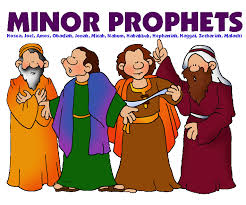Zechariah 1:1 – In the eighth month, in the second year of Darius, the word of the Lord came to the prophet Zechariah, the son of Berechiah, son of Iddo, saying,
Welcome to our study of Zechariah. The first verse of this book essentially gives us Zechariah's credentials.

He is the son of Berechiah and the grandson of Iddo. However, in the book of Ezra (Ezra 5:1, 6:14) he is referred to only as the son of Iddo. According to the reckoning of the Jews this most likely means that Berechiah died very young and Zechariah was raised by his grandfather. He was born in Babylon and brought back to Jerusalem as an infant.
According to Nehemiah 12:12-16, Iddo and Zechariah were priests, who served under the high priest Joshua (Joshua will be mentioned in one of the visions of Zechariah). This means that Zechariah served as a priest before being called to the office of prophet. Even after being assigned the office of prophet, Zechariah continued in the priesthood.
But regardless of his lineage or experience, the foundation of his ministry rested on one irrefutable fact: God had divinely appointed him to the prophetic office. God spoke directly to him, and it was then his responsibility to deliver that message to Israel, regardless of the outcome.
In a best-case scenario, Zechariah would be honored and revered as the messenger of God. The Jews would listen to the message, follow God's commands and everyone (including Zechariah) would live happy, fulfilled, and prosperous lives from that moment forward. But in the case of the prophets of Israel, this was rarely the outcome.
More often, the prophets were both feared and hated among their own countrymen. They were cast into prison, mocked, threatened, bound, starved, abused and even killed for the message they delivered. Make no mistake - the office of a prophet was a tough role to fulfill. It has sometimes been joked that God appointed them because no one would volunteer for the job!

Before the captivity, it was common practice for the prophets to date their messages by using the reigns of the kings of Judah or Israel. For example, Jeremiah dates his first message like this:
Jeremiah 1:2 – Jeremiah to whom the word of the Lord came in the days of Josiah the son of Amon, king of Judah, in the thirteenth year of his reign.
Because of this, we know what was going on in the nation when the prophets spoke, and we can surmise a fairly accurate date for their prophecy. This also aids us in understanding/interpreting their messages.
Zechariah, however, is ministering after the collapse of the monarchy and subsequent captivity, so he dates his messages by the reign of Darius, king of Persia who ruled the Jews at that time. Haggai, who ministered during the same time frame, also uses the reign of Darius to date his messages (Haggai 1:1).
Zechariah 1:2 – "The Lord was very angry with your fathers."
For the Jewish people, there was an enormous amount of history included in this very short sentence. None of the implications of it escaped their attention; indeed, the words of the prophet most assuredly struck terror/dread into the hearts and minds of that generation.

In order for us to understand what is happening, we need to review just a bit of that history.
God promised to give his people a land flowing with milk and honey where they could live in close communion with him, serve him, worship him, and be a blessing to all the nations of the earth.
We know that God kept his promise. Israel became a nation, and she lived in peace and prosperity for many years. God blessed her, expanded her territory, and gave her victory over her enemies. All this time Israel had fellowship with God through sacrifices, offerings, festivals, worship, and keeping the law.
Although Israel made mistakes along the way, God was willing to hear and forgive when the people repented. Once a year, on the Day of Atonement, he covered the sin of Israel with the blood of an animal (Leviticus 16:1-30).
But there was one grievous and persistent sin which eventually led to Israel's downfall: Idolatry.

Jehovah had blessed Israel with every material and spiritual blessing imaginable. When the Jews turned around and gave the glory/praise/thanksgiving for these blessings to a false idol or demonic spirit, it was a slap in the face to God, and he wasn't going to stand for it.
That kind of behavior also profaned and disgraced God's holy name in front of the heathen nations. Instead of being a living witness to the love and mercy of God, Israel became a billboard for serving Satan. God made it very clear that that behavior made him angry, and he would discipline Israel for it (Deuteronomy 6:12-15, Judges 2:11-15).
But the people of Israel did not listen or heed the warning. They rebelled against the Lord. As you read through the books of Judges, Kings and Chronicles, you will find that (with very few exceptions) the nation constantly worshiped Baal, Molech, Chemosh, Ashtoreth and other false gods.
In response, God once again kept his promises – he displaced Judah (and Israel) from their land. He allowed the vile Babylonians to devastate the land, destroy the temple and burn Jerusalem. The Jews once again fell into bondage/slavery to a foreign power. They were no longer self-governing. They were no longer prosperous. They were cut off from all forms of fellowship with the Lord (sacrifices, festivals, temple worship, etc) and they had no high priest who could consult the Lord on their behalf:
Hosea 3:4 – For the children of Israel shall abide many days without a king, without a prince and without a sacrifice, and without an image, and without an ephod.
At the same time, the Jews suffered a kind of identity crisis. All Israelites had a very strong sense of national pride. Being one of God's chosen people and dwelling in the Promised Land was a part of the very fiber of their being. It was part of their identity as individuals and as a nation. Banishment from the land struck the very core of who the Israelites believed themselves to be. Everywhere they turned, they were faced with confusion and chaos.
All this was the result of God's judgment upon Israel for her idolatry. The nation had been humbled and humiliated by God, so that he could once again restore fellowship with them.
This was the devastating history that Zechariah was referring to when he said 'the Lord was angry with your fathers'.

Now keep in mind that Zechariah was addressing a new generation of Israelites which God brought back to Jerusalem after the 70 year exile. He instructed them to rebuild the walls of the city and the temple. They started that task, but due to severe opposition, they never finished. In response, God sent Zechariah (and Haggai) to stir up or motivate the people to finish their work.
Zechariah's opening statement no doubt triggered grave concern in the minds of the current generation. The last thing they wanted to do was provoke God as their forefathers had done. There can be no doubt that God had their attention!
Zechariah 1:3 – "Therefore say to them, 'Thus declares the Lord of Hosts: Return to me, says the Lord of hosts, and I will return to you, says the Lord of Hosts.'"
Now we see the true reason for striking fear/dread into the minds of the Jews – it instantly captured their attention and put them into a state of willingness to follow the Lord's commands. In this case, the command is for the people to return to the Lord.
What is meant by that?

God was looking for a sincere state of repentance from his people. Remember, the Jews willingly returned to the land when God called them, but they soon gave up on God's agenda and became devoted to their own private concerns. They set about trying establish their own niche in society/culture, and amass their own wealth. They began to marry heathen women and otherwise forsake the laws of God.
They claimed to be God's people, but in reality their hearts and minds were far from him.
It was important for them to understand that God wasn't looking for 'lip service'. He didn't want Israel to simply go through religious motions; he wanted their hearts and minds to be his. He wanted to fellowship with them in a true relationship, on the most intimate level possible.
If Israel truly wanted to be God's people, they needed to return to him body, soul, mind and spirit. This required not only an acknowledgement of sin, but a change of heart and a commitment to reform their future actions.

The good news is that God assured Israel that if they would turn to him, he would welcome them back; their relationship could be fully restored.
It's no accident that God referred to himself as 'The Lord of Hosts' three times in this passage. That title, which is frequently found in both Haggai and Zechariah, implies God's boundless resources and universal power. Clearly, if Israel was willing to repent, God would once again move on her behalf just as he had done during the conquest of the Promised Land. He would make Israel successful in all of her endeavors.
Here is something else to consider: God was not asking his people to do the impossible. The command of God to 'return to me' clearly indicates that the Jews had the power to repent and return to him, if only they would. In other words, if they would only take advantage of the grace God had already offered to them, God would take them back.
How does this apply to us?
There is no doubt that on an individual basis, God wants a deeper relationship with each one of us. The apostle James tells us this:
James 4:8 – Draw near to God, and he will draw near to you. Cleanse your hands, you sinners, and purify your hearts, you double-minded.
The interesting thing about this verse is that James is NOT addressing unbelievers. He is giving a warning to Christians against worldliness.

The fact is, as Christians we can fall into the same traps as the ancient Israelites did. We start to mimic the culture around us, instead of presenting a true picture of the holiness of our God. We have a tendency to devote too much time and energy into acquiring the things of this world, while neglecting the work of the kingdom.
The good news is that God is calling us to return to fellowship with him, just as he called the Israelites:
Revelation 3:20 – Behold, I [Jesus] stand at the door and knock. If anyone hears my voice and opens the door, I will come in to him and eat with him, and he with me.
Again, this verse is not being spoken to unbelievers! It is spoken to the church of Laodicea; it is directed at Christians. In light of these verses, it is apparent that each one of us has room to enhance our relationship with God. Each one of us has been personally invited by the Lord of Hosts to enter a deeper and more intimate relationship with him.
But it will take repentance on our part – not only a confession of past mistakes, but a change of heart and a commitment to cleanse ourselves of the world and change our actions going forward.
On the surface, that sounds simple enough. But practically speaking, it can be very difficult! If we are honest, all of us probably have some sins in our lives that we don't really want to admit, much less give up.
Plus, the more we strive for personal holiness, the more different we become from the world and the more we open ourselves up to ridicule or abuse. But the bottom line is that we must make a choice.
Remember, God's offer implies that he will give us the capacity to change if we desire it. When we accept his offer to draw closer to him, Holy Spirit will be right beside us, helping to prune those dead spots from our lives, giving us boldness and making us more fruitful for his kingdom.
Let's also look at this verse through a national lens.

Just like Israel, America was founded on a covenant with God. For many years, we kept him at the center of our nation, and we prospered. But that is no longer the case – we have slipped into idolatry; we now worship money, sex and self gratification. As a result, violence, corruption, chaos and financial ruin are now at our door. In my opinion, it is only the grace of God that is keeping our nation from crumbling around us.
But I believe that the Lord of Hosts is making the same offer to us that he made to Israel. If we will return to him, he will return to us and heal our land:
II Chronicles 7:14 – If my people who are called by my name humble themselves, and pray and seek my face and turn from their wicked ways, then I will hear from heaven and will forgive their sin and heal their land.
This task will be difficult. It will involve prayer, drawing closer to God and establishing personal holiness. We will need Holy Spirit to give us supernatural boldness to stand for Christ in a dark culture.
Zechariah 1:4 – "Do not be like your fathers, to whom the former prophets cried out, 'Thus says the Lord of Hosts, return from your evil ways and from your evil deeds.'" But they did not hear or pay attention to me, declares the Lord.
Evil Ways – This phrase refers to all forms of idolatry and idolatrous worship.
Evil Deeds – This refers to all the immorality and other sins/transgressions of the law practiced by the Jews.
Your Fathers – This refers to former leaders and influential people of society who helped determine the course of the nation. This would include the kings, the elders of the nation and even some of the priests.
Zechariah tells us that these leaders were not righteous followers of God. They had been warned on numerous occasions to turn from their evil ways and serve the Lord, but they refused:
II Chronicles 36:15-16 – The Lord, the God of their fathers, sent persistently to them by his messengers, because he had compassion on his people and on his dwelling place. But they kept mocking the messengers of God, despising his words and scoffing at his prophets, until the wrath of the Lord rose against his people, until there was no remedy.
Although we have no way of identifying every idolatrous elder or wayward priest, we can certainly identify some of the kings who led the nation away from God. These would include Ahab and Jezebel, Omri, Jeroboam son of Nebat, Manasseh, etc.
Can you name more of the idolatrous leaders of Judah/Israel and give examples of how they sinned?
Former Prophets – Old Testament prophets served in multiple capacities. They predicted coming events, exhorted people to repentance, enforced God's laws, announced judgment for disobedience and served in pastoral roles.
Although Israel had prophets all throughout her history, Zechariah is referring specifically to the prophets who ministered between the time Israel entered the Promised Land and the time she went into captivity.

This would include Isaiah, Jeremiah and many of the minor prophets such as Hosea, Haggai, and Zechariah. It also includes prophets who did not have their works preserved in separate biblical books. Notable Old Testament examples include Elijah, Elisha, Nathan, Azariah, Gad and Micaiah.
The bottom line is that when the leaders of Israel fell into sin and rebellion, God responded by warning them to repent. It wasn't just a single warning; he sent multiple messages through multiple prophets:
Jeremiah 25:3-6 – "For twenty-three years, from the thirteenth year of Josiah the son of Amon, king of Judah, to this day, the word of the Lord has come to me, and I have spoken persistently to you, but you have not listened. You have neither listened nor inclined your ears to hear, although the Lord persistently sent to you all his servants the prophets saying, 'Turn now, every one of you, from his evil way and evil deeds do not go after other goes to serve and worship them, or provoke me to anger with the work of your hands. Then I will do you harm.'"
Despite the warnings of the prophets, the former leaders of Israel did not listen, and eventually they were sent into captivity (Psalms 78:54-61). This is the point that Zechariah is now making to the current generation of Jews. They were well aware of the judgment leveled against their ancestors. Zechariah implores them not to make the same mistake. They MUST repent and serve the Lord, or judgment will fall upon them too.
Zechariah 1:5 – "Your fathers, where are they? And the prophets, do they live forever?
This verse has been interpreted in slightly different ways.
One interpretation, which was favored by the ancient scholars, said that God asks the question 'Your fathers, where are they?' The implication is that the hopes, plans and desires of their ancestors remained unfulfilled because their lives were cut short by their rebellion against the Lord.
In response, the idolatrous Jews answered, 'Do the prophets live forever?' They seem to push back by saying that the righteous prophets also died prematurely in many instances while leaving behind unfinished plans. Therefore, there is no real difference between the righteous and the wicked.

Another interpretation asserts that the prophets mentioned here are not righteous prophets, but false prophets. In this explanation, God is telling the Jews that their idolatrous ancestors and the false prophets they followed were both dead; nothing they did had any lasting value. In fact, their leadership took the nation into captivity. Therefore, if the current generation of the Jews wanted to re-establish the covenant and the nation of Israel, they should renew their commitment to God.
A third interpretation says that the question 'Your fathers where are they?' refers to the tombs of their ancestors. The implication is that because of their idolatry, the Jews were sent into captivity, and thus they died in a foreign land, which was a great disgrace to the children of Israel. They brought this fate upon themselves, through their disobedience and refusal to repent.
This theory maintains that the question 'do the prophets live forever?' refers to the fact that after the ministry of Zechariah and Malachi, there were no more prophets until the time of Christ.
Regardless of which interpretation we choose, the overall meaning becomes clear when we look at verse six:
Zechariah 1:6 - But my words and statutes, which I commanded my servants the prophets, did they not overtake your fathers? So they repented and said, 'As the Lord of hosts purposed to deal with us for our ways and deeds, so has he dealt with us.'"
All men, whether righteous or wicked, will die sooner rather than later and their memories will eventually disappear from the earth. By contrast, the word of God is permanent and lasting. It will never fade away or be extinguished and it always proves itself to be true (I Peter 1:24-25).
In this verse, God is reasoning with his children. He reminded them of the terrible judgment brought upon their ancestors as a result of rebelling against his laws and statutes. In fact, after the promised judgments had come to pass and the people were in captivity, even their rebellious forefathers (the ones that were still alive) admitted that God had dealt justly with them. They suffered, but that suffering was brought about by their own actions.
And here is the really important part: Since God does not change, the current generation could expect to experience the same (or worse) judgments if they too rebelled against God.

Thus, Zechariah's message is really one of mercy, grace and encouragement. The Jews are once again being given an invitation to repent and embrace the Lord with all of their heart, soul, mind and strength. If they answer the call, God will bless them as his obedient children. But if they refuse/rebel, they will not escape judgment any more than their ancestors did (Isaiah 1:16-20).
It was time for God's people to get moving again!
Let me offer you some encouragement:
God issued a personal invitation to the people of Israel to return to him. He wasn't interested in vain religious exercises; he wanted a people who were devoted to having a relationship with him.
God is making the same offer to us today. He stands at the door of our heart and knocks, desiring to be admitted into a deeper place in our lives. Opening the door to him is both simple and difficult, because it will require change in our lives. But in the end a closer, deeper walk with Christ will be well worth the price!
Let me offer you some relief:
As we noted in today's post, God gives us the capacity to draw closer to him. As we do, Holy Spirit will actively help us to prune sin out of our lives.
In the natural realm, you don't prune plants too much at one time, because it will shock and harm the plant. The same is true in a spiritual sense.
If you feel overwhelmed by the amount of sin that needs pruned from your life, don't despair. Ask Holy Spirit to help you pick a single thing/area that needs cleaned up and conquer that area before going any further. Holiness is a process that takes place over time.
Let me offer you some strength:
God consistently refers to himself as 'The Lord of Hosts'. As we mentioned, this implies his boundless resources and universal power. To put it another way, nothing is impossible for God!
God called Zechariah to a destiny that was impossible in his own strength. But the prophet was successful because he trusted and followed the Lord of Hosts.
What is God calling you to do? My guess is that it will be just as impossible as the task set before Zechariah. But if you will surrender to the Lord of Hosts, he will cause you to succeed too!
